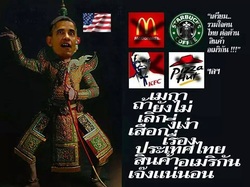 The posting that accompanies this blog was downloaded from the Internet. It is a warning in Thai that if the USA persists in interfering in Thai affairs a number of American franchises may face bankruptcy here. It is a reaction to a statement a week ago by US Secretary of State, John Kerry, that the military coup in Thailand will have diplomatic consequences. The United States foreign policy position over the years is to favor democracies. In any democratic system the people have to have a voice. At the very least, the people have to have the right to vote for those who will write laws and run the government. It is not valid to say the people do not vote for the right reasons so their right to vote must be suspended. This past week this has emerged as the center of an argument between the US State Department and the military authorities in Thailand. Members of the public have voiced heated opinions about this. The opinion most often heard from Thai patriots such as the ones who posted the anti-US warning, is that the USA does not understand how flawed the electoral process in Thailand as been: “People sell their votes for cash. An even larger group is persuaded to vote for parties who promise social rewards and popular projects so the party leaders can gain power. This is so deeply ingrained that the electoral process is beyond repair. A whole new electoral system has to be created, and so Thailand needs a ‘time out’ for that to happen. The only power strong enough to impose the time out is the military.” Opponents of the Thai military coup, which is billed by the Army as a strategy to cool everybody down so the game of democracy can start over, say that the real plan is to shore up the team that has always been in control, made up of an alliance of the social and financial elite and the military. Recently, a new alliance has successfully opposed them, made up of newly emerging financial giants and the working class. The former have their power base in and around Bangkok, and the latter are “upcountry”. As long as the military stayed in camp and in the background, the elite side could not regain control over the populist side. When the Army left the camps, the balance tipped. From the US State Department perspective, the aspect of this that is unacceptable is the suspension of the electoral process. This, and this alone, invalidates the military take-over as a democratic government. When the people have no voice there is no democracy. The US government will not deal with undemocratic governments in the same way as it does democratic ones. The way to fix a corrupted electorate is never to limit discussion, but to expand it. Only the people can fix a democracy. That is what the debate is about between the US government and the Thai government. But there is another murky level, less crystal clear and doctrinaire. In reality the USA has very often acted otherwise than in support of democracies, and people usually do not like to be preached to by hypocrites who say one thing and do another. So, in public, name-calling often takes the place of discussion when foreign policy debate is confused with actual reality. Behind the scenes, as always, “realpolitik” goes on. Only a fool really believes that the US Secretary of State and the US Ambassador to Thailand have not been adequately briefed on the nuances and dynamics of the Thai political situation. The military leaders are not fools. They know the difference between public policy and realpolitik. So they, on both sides, know that this 19th military take-over of government in Thailand will have consequences at the public policy level, but another much softer impact on the real relationship between the USA and Thailand. I will not say that Thai commentators on the Internet and in other media are fools because they do not believe Secretary of State, John Kerry and US Ambassador to Thailand, Kristie Kenney understand Thai realities. A fool is one who understands the truth but refuses to accept it. Those commentators may believe that the USA is wrong to preach that suspension of democracy is no way to fix democracy. Those commentators may actually believe that the military are doing what is best under the circumstances. It is possible that even John Kerry, the US ambassador’s boss, may believe that the Thai military may not be doing what is best, but it is doing what is second best on a long list of far worse strategies. In realpolitiks, how Thailand solves its political problems really is an internal matter. Almost everybody knows that. Only in terms of public policy, which involves international relations at a government-to-government level, is the Thai military take-over of the Thai peoples’ government an international matter. Thai patriots who cry “foul” when the US government voices its opposition to the coup and to the suspension of the people’s voices and votes are the ones who cannot distinguish realms of reality. And how could they understand what international foreign policy is? Having no interest at all in foreign affairs for years on end they cannot be reasonably expected to suddenly gain international affairs expertise. But if they allow themselves to be jerked around because they don’t care about the issues, but just care about appearing to be patriotically anti-American, then they are fools. They are just as much fools as the ex-patriots living here who refuse to admit that at the level of reality the Thai military take-over of government really is an internal Thai matter.
0 Comments
Leave a Reply. |
AuthorRev. Dr. Kenneth Dobson posts his weekly reflections on this blog. Archives
March 2024
Categories |
| Ken Dobson's Queer Ruminations from Thailand |
|
 RSS Feed
RSS Feed
